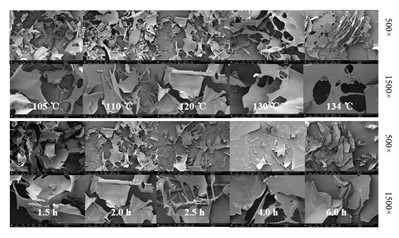Study on physicochemical properties of polysaccharides and glycosides from Rehmannia glutinosa under different processing conditions
DOI:
https://doi.org/10.18686/fnc.v2i2.168Keywords:
Rehmannia glutinosa; high-pressure processing process; polysaccharides; glycosidesAbstract
AIM: The physicochemical properties of polysaccharides and changes in the glycoside composition under different processing conditions of Rehmannia glutinosa were studied. METHODS: High-pressure processing temperature, processing time, processing frequency, and thickness of fresh Rehmannia glutinosa slices were taken as factors, and the contents of polysaccharides, catalpol, and rehmannioside D were taken as evaluation indexes. The physicochemical properties and the inhibition of α-glucosidase were characterized via ion chromatography, Fourier transform infrared spectroscopy, and environmental scanning electron microscopy. RESULTS: The parameter values for the highest polysaccharide content were as follows: processing temperature of 110 ℃, processing time of 4 h, processing frequency of 2 times, and slice thickness of 1.0–1.5 cm. The parameter values for the highest α-glucosidase inhibition rate were as follows: processing temperature of 120 ℃ and processing time of 2 h. The surface morphology of polysaccharides from Rehmannia glutinosa showed irregular fragments, and glucose and galactose were dominant. The α-glucosidase inhibitory activity of polysaccharides from processed Rehmannia glutinosa reached 60% at a low concentration of 0.05 mg/mL.

Downloads
Published
How to Cite
Issue
Section
License
Copyright (c) 2024 Yahui Jia, Chunnan Wen, Miao Liu, Yuan Ruan, Yanyan Qian, Bingji Ma, Li Wang

This work is licensed under a Creative Commons Attribution 4.0 International License.
References
1. Jia J H, Chen J F, Wang G L, et al. Progress of research into the pharmacological effect and clinical application of the traditional Chinese medicine Rehmanniae Radix. Biomedicine & Pharmacotherapy. 2023; 168: 115809. doi: 10.1016/j.biopha.2023.115809 DOI: https://doi.org/10.1016/j.biopha.2023.115809
2. Li J N, Long H, Cai Z, et al. Study on anti-fatigue effect of Rehmannia glutinosa polysaccharide. Biological Chemical Engineering. 2021; 7(5): 71-74. doi: 10.3969/j.issn.2096-0387.2021.05.018
3. Qian Y, Wang L, Zhang Z, et al. Physical-chemical properties of heteropolysaccharides from different processed forms of Rehmanniae Radix. Process Biochemistry. 2022; 121: 481-492. doi: 10.1016/j.procbio.2022.07.032 DOI: https://doi.org/10.1016/j.procbio.2022.07.032
4. Wang L, Wen C, Qian Y, et al. Preparation Method of High-Molecular-Weight Rehmannia Polysaccharide and Method for Steaming Fresh Rehmannia Under High Pressure to Obtain Prepared Rehmannia Root. CN112870271A, 1 June 2021.
5. Gao Y, Hu H, Yang H, et al. Study on industrialization process of prepared Radix Rehmanniae. Guangzhou Chemical Industry. 2021; 49(15): 101-103. doi: 10.3969/j.issn.1001-9677.2021.15.030
6. Hua Y, Yao W, Ji P, et al. Integrated metabonomic–proteomic studies on blood enrichment effects of Angelica sinensis on a blood deficiency mice model. Pharmaceutical Biology. 2017; 55(1): 853-863. doi: 10.1080/13880209.2017.1281969 DOI: https://doi.org/10.1080/13880209.2017.1281969
7. Wang L, Zhao Z, Zhao H, et al. Pectin polysaccharide from Flos Magnoliae (Xin Yi, Magnolia biondii Pamp. flower buds): Hot-compressed water extraction, purification and partial structural characterization. Food Hydrocolloids. 2022; 122: 107061. doi: 10.1016/j.foodhyd.2021.107061 DOI: https://doi.org/10.1016/j.foodhyd.2021.107061
8. Ruan Y, Niu C, Zhang P, et al. Acid-Catalyzed Water Extraction of Two Polysaccharides from Artemisia argyi and Their Physicochemical Properties and Antioxidant Activities. Gels. 2021; 8(1): 5. doi: 10.3390/gels8010005 DOI: https://doi.org/10.3390/gels8010005
9. Wang L, Zhang P Z, Shen J W, et al. Physicochemical properties and bioactivities of original and Se-enriched polysaccharides with different molecular weights extracted from Pleurotus ostreatus. International Journal of Biological Macromolecules. 2019; 141: 150-160. doi: 10.1016/j.ijbiomac.2019.08.250 DOI: https://doi.org/10.1016/j.ijbiomac.2019.08.250
10. Ren X, Liu C, Zhang Z, et al. Different factors affecting the content of Verbascoside content in Rehmannia Glutinosa. Chinese Medicine Modern Distance Education of China. 2022; 20(17): 144-146. doi: 10.3969/j.issn.1672-2779.2022.17.052
11. Li X, Xing YD, Li SS, Liu H. Effect of different processing methods on the contents of seven chemical components in Rehmanniae Radix Praeparata. Journal of Bengbu Medical College. 2020; 45(05): 634-637, 643.
12. Yan Z, Xie Y, Chen C, et al. Research progress on chemical composition changes and pharmacological effects of Rehmannia glutinosa during processing. Lishizhen Medicine and Materia Medica Research. 2021; 32(10): 2493-2495.
13. Wei G, Gao S. Study on hot-air drying characteristics and catalpol content for Radix Rehmanniae slices. Farm Products Processing. 2022; 14: 18-23. doi: 10.16693/j.cnki.1671-9646(X).2022.07.034
14. Wei GD, Wen XS. Characteristics and kinetics of catalpol degradation and the effect of its degradation products on free radical scavenging. Pharmacognosy Magazine. 2014; 10(Suppl 1): S122-S129. doi: 10.4103/0973-1296.127360 DOI: https://doi.org/10.4103/0973-1296.127360
15. Qian Y. Study on the Physical and Chemical Properties of Sugar Components in Different Processed Rehmannia Glutinosa Products and Optimization of High-pressure Steaming Conditions (Chinese) [Master’s thesis]. Henan Agricultural University; 2022.
16. Granum E, Myklestad SM. A simple combined method for determination of β-1,3-glucan and cell wall polysaccharides in diatoms. Hydrobiologia. 2002; 477(1): 155-161. doi: 10.1023/A:1021077407766 DOI: https://doi.org/10.1023/A:1021077407766
17. Lu MK, Chang CC, Chao CH, et al. Structural changes, and anti-inflammatory, anti-cancer potential of polysaccharides from multiple processing of Rehmannia glutinosa. International Journal of Biological Macromolecules. 2022; 206: 621-632. doi: 10.1016/j.ijbiomac.2022.02.112 DOI: https://doi.org/10.1016/j.ijbiomac.2022.02.112
18. Niu B. The sweetest sugar—Levulose. Chemical Technology Market. 2002; 8: 12-14, 19.
19. Yang Y, Wang Y, Ma Y, et al. Preparation and structural characteristics of sulfated polysaccharides from Aralia chinensis root-bark and its antioxidant activity. Guihaia 2018; 38(7): 911-923. doi: 10.11931/guihaia.gxzw201709014
20. Qian JY, Chen W, Zhang WM, et al. Adulteration identification of some fungal polysaccharides with SEM, XRD, IR and optical rotation: A primary approach. Carbohydrate Polymers. 2009; 78(3): 620-625. doi: 10.1016/j.carbpol.2009.05.025 DOI: https://doi.org/10.1016/j.carbpol.2009.05.025
21. Ma J, Qiao Z, Xia X. Optimisation of extraction procedure for black fungus polysaccharides and effect of the polysaccharides on blood lipid and myocardium antioxidant enzymes activities. Carbohydrate Polymers. 2011; 84(3): 1061-1068. doi: 10.1016/j.carbpol.2010.12.068 DOI: https://doi.org/10.1016/j.carbpol.2010.12.068
22. Qian Y, Wang L, Wen C, et al. Purification, physicochemical property and antioxidant activity analysis of oligosaccharides from the fresh roots of Rehmannia glutinosa Libosch. Natural Product Research and Development. 2021; 33(9): 1470-1477. doi: 10.16333/j.1001-6880.2021.9.004
23. Yu F, Li QH. The inhibiting activity of pumpkin polysaccharide on α-glucosidase (Chinese). Food Science and Technology. 2011; 36(09): 202-206. doi:10.13684/j.cnki.spkj.2011.09.015
24. Wu Y. New Compilation of Materia Medica (Chinese). Shanghai Scientific & Technical Publishers; 1982. 63-64.
25. Geng X. Research progress on chemical constituents and pharmacological effects of Rehmannia Glutinosa (Chinese). Heilongjiang Science. 2022; 13(24): 51-53. doi: 10.3969/j.issn.1674-8646.2022.24.015
26. Bian Z, Zhang R, Zhang X, et al. Extraction, structure and bioactivities of polysaccharides from Rehmannia glutinosa: A review. Journal of Ethnopharmacology. 2023; 305: 116132. doi: 10.1016/j.jep.2022.116132 DOI: https://doi.org/10.1016/j.jep.2022.116132
27. Chen S, Li J, Wu X, et al. Advances in pharmacology of Rehmannia glutinosa. Chemical Engineer Journal. 2019; 33(11): 46-50. doi: 10.16247/j.cnki.23-1171/tq.20191146
28. Henan Medical Products Administration. Notice from the Henan Provincial Food and Drug Administration on the issuance of the “Guidance on Standardizing the Fresh Cutting and Processing of Chinese Medicinal Materials in Henan Province (Trial)” (Chinese). Available online: https://yjj.henan.gov.cn/2022/12-15/2657501.html (accessed on 16 April 2024).
29. Ren X, Liu C, Zhang Z, et al. Different factors affecting the content of Verbascoside content in Rehmannia Glutinosa. Chinese Medicine Modern Distance Education of China. 2022; 20(17): 144-146. doi: 10.3969 /j.issn.1672-2779.2022.17.052
30. Yu WN, Zhang ZL, Li KK, et al. Determination of the content of iridoid glycosidein from different parts of the fresh Rehmanniae flowers. Food Research and Development. 2017; 38(14): 134-137. doi: 10.3969/j.issn.1005-6521.2017.14.028




.jpg)
.jpg)

